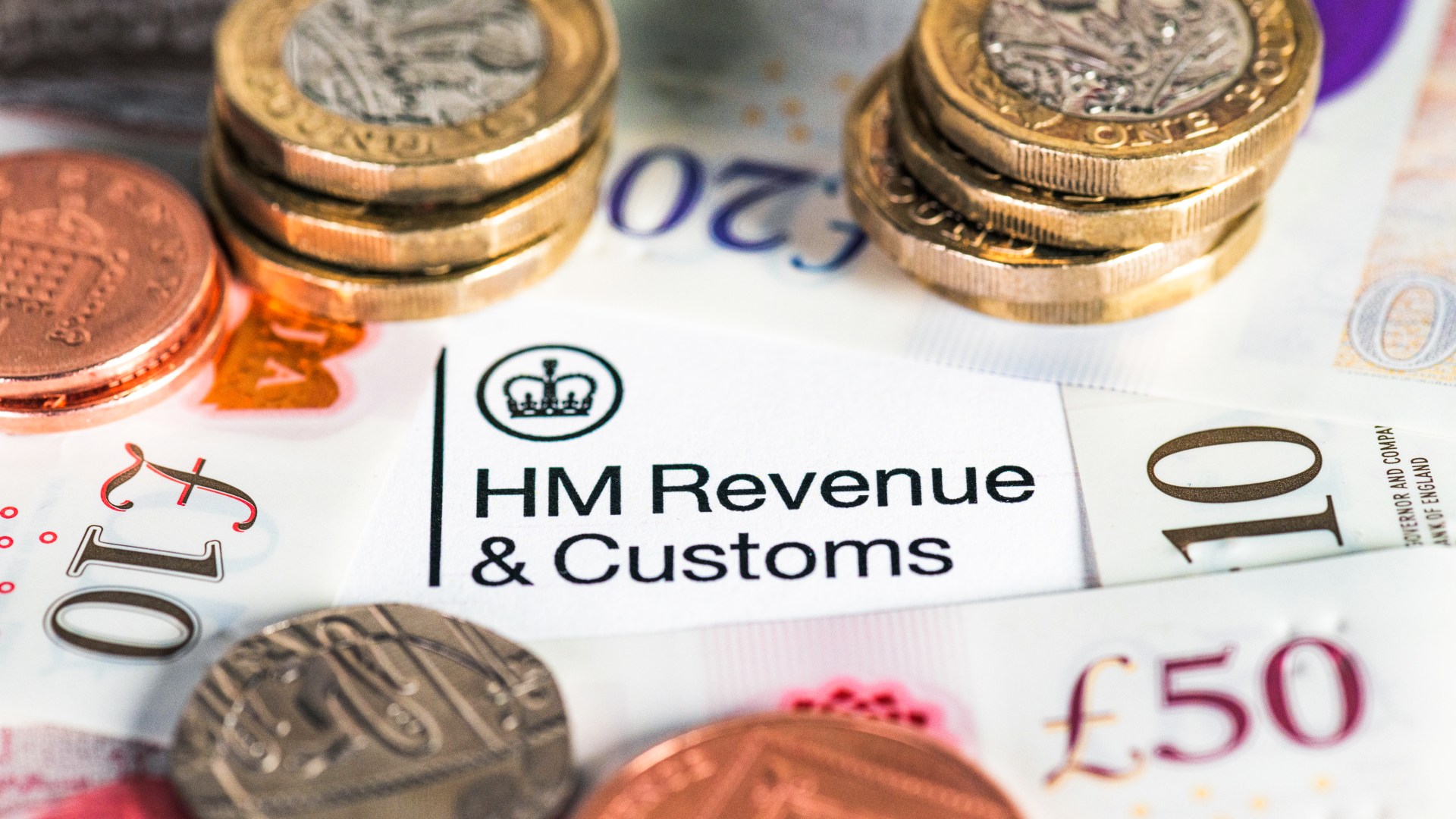Money
11 codes on payslips that reveal if HMRC owes you a tax refund

WORKERS can scour their payslips to discover if they are due a tax refund that could be worth thousands of pounds.
HMRC codes indicate the level at which you are being taxed on your income.
If your code isn’t correct for your financial circumstances, you could be paying more in tax than you should be and may be owed money back.
The code you need to look out for is a mixture of numbers and letters.
If you realise you’re paying the wrong amount in tax, you can claim back overpaid cash for up to four years after.
However, the onus is on you to check that it’s right and let HMRC know if there is a discrepancy.
Here we explain what each code means so you can work out if you’re being taxed the correct amount.
Plus, how to challenge your code if you realise that it’s wrong.
TAX CODES EXPLAINED
The letters at the start of your tax code all mean something different and will show whether you are entitled to the personal allowance. This is the amount you can earn each year before being taxed and it currently stands at £12,570.
- L – You’re entitled to the standard tax-free Personal Allowance. The common tax code is 1257L.
- M – Marriage Allowance: you’ve received a transfer of 10% of your partner’s personal allowance (£1,257)
- N – Marriage Allowance: you’ve transferred 10% of your personal allowance to your partner
- S – Your income or pension is taxed using the rates in Scotland
- T – Your tax code includes other calculations to work out your personal allowance, for example, it’s been reduced because your estimated annual income is more than £100,000
- 0T – Your personal allowance has been used up, or you’ve started a new job and your employer doesn’t have the details they need to give you a tax code
- BR – All your income from this job or pension is taxed at the basic rate (usually used if you’ve got more than one job or pension)
- D0 – All your income from this job or pension is taxed at the higher rate (usually used if you’ve got more than one job or pension)
- D1 – All your income from this job or pension is taxed at the additional rate (usually used if you’ve got more than one job or pension)
- NT – You’re not paying any tax on this income
- Tax codes starting with K mean you have income that isn’t being taxed another way and it’s worth more than your tax-free allowance
There are different reason you could be on the wrong tax code. Often an error can be made if you change your or your salary changes.
HMRC might not have been given updates relating to new circumstances.
You should check your tax code when you move jobs or if you have a change in salary to make sure you’re still paying the right amount.
What if my tax code is wrong?
If you think you might be on the wrong tax code, contact HMRC. You can call them on 0300 200 3300.
Or, you can send a letter to the following address: Pay as You Earn and Self Assessment, HM Revenue and Customs, BX9 1AS, United Kingdom.
If you are on the wrong tax code and have been paying too much, HMRC will change it so you pay the correct amount moving forwards.
You should then be reimbursed for any tax you’ve overpaid.
You could, however, contact HMRC about an incorrect tax code and find you have underpaid tax.
In this case, you will usually have to pay the money back over 12 months.
But, only if you are earning enough income over the Personal Allowance, which is currently £12,570, and owe less than £3,000 back.
HMRC might get in touch with you to tell you you’re owed a tax rebate, too.
In this case, you’ll get a P800 letter or a simple assessment letter in the post.
A P800 might tell you if you’ve not paid enough tax and have to pay it back. It will say if you can claim online through the government’s website.
If you can claim online, you’ll need your Government Gateway ID and password. The money will then be sent to your bank account within five days.
You can also claim your refund through the HMRC app.
If your P800 letter tells you you will be paid your tax rebate via cheque in the post, you should receive it within 14 days of the date on your letter.
If you’re owed tax from more than one year, you’ll get a single cheque for the entire amount.
How do I check my tax code?
YOU can check your tax code on your personal tax account online, on any payslips or on the HMRC app.
To log in, visit www.gov.uk/personal-tax-account.
If you have one, you can also check it on a “Tax Code Notice” letter from HMRC.
Bear in mind that you might need your Government Gateway ID and password to hand to log in.
But if you don’t have this you can use your National Insurance number or postcode and two of the following:
- A valid UK passport
- A UK photocard driving licence issued by the DVLA (or DVA in Northern Ireland)
- A payslip from the last three months or a P60 from your employer for the last tax year
- Details of a tax credit claim if you have made one
- Details from a self assessment tax return (in the last two years) if you made one
- Information held on your credit record if you have one (such as loans, credit cards or mortgages)
Money
The Morning Briefing: Social enterprise to solve the advice gap


Good morning and welcome to your Morning Briefing for Monday 21 October 2024. To get this in your inbox every morning click here.
Social enterprise to solve the advice gap
Financial advice firms are increasingly aware of their social responsibilities and are meeting them in numerous ways, from pro bono and charity work to B-Corp certification, which assesses the social and environmental impact of business practices.
Some firms are focusing their efforts on addressing the ‘advice gap’, where people who would benefit from financial advice cannot afford it.
But could social enterprises — businesses that trade for a social and/or environmental purpose — provide a longer-term solution?
MM Talks with Kim, Lois an Tom
Join Kimberley Dondo, Lois Vallely and Tom Browne from the Money Marketing team for the third episode of MM Talks.
This episode explores the FCA’s consolidation review, and speculation of the upcoming budget’s impact on financial advisers, and shares chillingly true finance horror stories from the internet. Listen now:
Quote Of The Day
Remember how your granny always told you that if something seems too good to be true then it probably is? You’d do well to apply this advice to investments too.
– Victoria Hasler, head of fund research at Hargreaves Lansdown, talks about how to avoid investment scams, in honour of Scams Awareness Week, which starts today
Stat Attack
New data from YouGov commissioned by BlackRock explores attitudes to investing by Europeans. The 2024 BlackRock People & Money Survey also examines why people across Europe feel they are not able to invest. The survey explores the attitudes of current investors and potential investors across 14 European countries.
29%
Of women now invest across Europe in 2024
11%
Increase year-on-year in the number of women investing
47%
Of men currently invest
4%
Growth (from 46% in 2022)
46%
Of 25-34-year-olds now invest
13%
Increase year-on-year (from 40% in 2022)
Source: BlackRock
In Other News
Janus Henderson today announces the launch of its first active ETF in Europe: the Janus Henderson Tabula Japan High Conviction Equity UCITS ETF (JCPN).
The launch of this active ETF provides investors with an alternative way of accessing the firm’s “deep knowledge and insights” in this market.
The fund will adopt a high conviction approach and invest in an actively managed all-cap concentrated portfolio of 20 to 30 holdings, providing exposure to companies that are set to benefit from structural themes and trends in the Japanese Equity market, and showcasing the best of Janus Henderson’s stock selection skills.
The launch of this active ETF represents an important milestone for Janus Henderson, allowing the firm to cater to client demand globally for its investment strategies to include a UCITS ETF wrapper.
It also builds upon the firm’s active ETF proposition in the US where it is fourth largest provider of actively managed fixed income ETFs.
Europe markets watchdog bids to become EU’s version of SEC (Financial Times)
Chinese banks slash lending rates to bolster ailing economy (Bloomberg)
UBS sells its 50% stake in Swisscard to American Express (Reuters)
Did You See?
It has been 10 years since financial education was introduced to the national curriculum for secondary schools in England.
At primary school level, the national curriculum provides a framework for young children to recognise coins and learn how to use money through simple ‘number problems’ in maths lessons.
The ‘real life’ context comes later, during citizenship or ‘personal, social, health and economic’ education from age 11.
However, says Amanda Newman Smith, some schools do not follow the national curriculum, adding weight to the criticism that financial education is inconsistent in England.
Earlier this year, a report by the House of Commons Education Committee found widespread evidence that financial education in England’s primary schools was “insufficient and should be expanded”.
So, how should financial education be presented to younger children and what role do financial advisers have in this?
Money
High street bargain chain with 800 branches to close ALL stores to give staff a break on Boxing Day

A MAJOR high street bargain retailer has confirmed it will shut all its stores on Boxing Day to give staff a well-earned break.
Poundland, which runs over 800 UK stores, said it will close shops on December 25 and 26.
The discounter said all its locations will also shut on New Year’s Day as a thank you to staff.
Meanwhile, workers will be given a £25 voucher to spend in their local Poundland branch on any Christmas shopping.
Simon Wells, people director at Poundland, said: “We have brilliant colleagues here at Poundland & Dealz who work incredibly hard throughout the year, bringing our brands to life every day and supporting our customers.
“But we know they all particularly shine at Christmas, bringing the magic to our stores that our customers know and love.
“We’re delighted to be able to support them with a well-earned rest once the festive season is over.”
It comes as Poundland launches a drive to employ 1,000 new seasonal staff to cover the busy festive period.
The majority of the shop floor roles will end on Christmas Eve while some will be extended until early January.
You can find out more by visiting Poundland’s website.
It is common practice for retailers to close their stores on Christmas Day but not all shut branches the following day.
Some also shut branches on New Year’s Day to give staff an extra day off over the Christmas period.
A number of other retailers have already confirmed they will shut on Boxing Day as well as Christmas Day this year.
Aldi confirmed it will shut on December 25 and 26, as will Home Bargains, John Lewis and Waitrose.
DIY retailer Homebase has also said it will shutter branches over the two-day period.
If you’re keen to find out whether your favourite retailer will close its branches on Boxing Day, it’s worth keeping an eye on social media.
Chains often publicise their festive opening hours on X and Facebook.
You can also try using a retailer’s store locator tool which should tell you the opening hours for your local branch.
Most of the time, it will also feature a number you can call to find out opening times.
The latest two announcements from Poundland come after the bargain chain launched its loyalty scheme UK-wide.
It is now rolling out its Poundland Perks rewards scheme to all branches and online.
The bargain discounter had been trialling the phone-based loyalty scheme at around 100 stores in Northern Ireland, Scotland, and the Isle of Wight since last year.
Shoppers can download the Poundland Perks app on to their smart phone via the Google Play and Apple App store.
Why do retailers close on Boxing Day?
BOXING Day is one of the busiest shopping days of the year.So why do retailers decide to close?
Senior Consumer Reporter Olivia Marshall explains.
Closing on Boxing Day allows staff to have a well-deserved break after the busy Christmas period.
This can help improve staff morale and reduce burnout.
It also provides them with an opportunity to spend time with their families and friends during the festive season.
For some retailers, the cost of opening on Boxing Day, including staffing and operational expenses, may not be justified by the expected sales revenue, especially if customer footfall is low.
With the rise of online shopping, some retailers may focus on online sales and promotions rather than opening physical stores on Boxing Day.
For some businesses, it may also be a a long-standing tradition for them to remain closed on Boxing Day.
From a practical perspective, the day after Christmas can be used for inventory checks, restocking, and preparing for post-Christmas sales.
This can be more effectively done without the distraction of serving customers.
Do you have a money problem that needs sorting? Get in touch by emailing money-sm@news.co.uk.
Plus, you can join our Sun Money Chats and Tips Facebook group to share your tips and stories
Money
Could social enterprises solve the advice gap?


Money makes the business world go around, but there is more to successful businesses than profits.
Financial advice firms are increasingly aware of their social responsibilities and are meeting them in numerous ways, from pro bono and charity work to B-Corp certification, which assesses the social and environmental impact of business practices.
Some firms are focusing their efforts on addressing the ‘advice gap’, where people who would benefit from financial advice cannot afford it.
It starts off about financial advice, but it will have a social impact. That’s why, for us, social enterprise is a win-win
But could social enterprises — businesses that trade for a social and/or environmental purpose — provide a longer-term solution?
A different approach
Social enterprise entrepreneur Nicole Bremner — who qualified as a non-practising financial adviser in Australia — is setting up a community interest company, Your Prosperity Group, to tackle the UK’s advice gap.
Bremner was motivated by seeing how distressed an elderly customer in a high-street bank had been as he insisted on making a payment to the bank or risk losing his life savings.
He did not receive the support he needed from the bank, and Bremner could not get this out of her mind.
Social enterprises rely on volunteers — but how do you maintain the quality and consistency of what is provided?
Drawing inspiration from the business model of family lawyer Jenny Beck, co-founder of Beck Fitzgerald, Bremner thought about partnering with financial advisers and other professionals to provide guidance to people who could not afford advice, supported by a reasonable fixed-fee model for those who could afford to pay.
At Your Prosperity Group, guidance will be free where a person’s net assets or household income are less than £35,000 a year — the average UK income.
Above this amount, a one-off fee of £1,499 is applicable, with follow-up meetings at £499 or an optional subscription of £35 a month.
“There is a mass of clients with less than £30,000 to invest who don’t need regulated financial advice,” says Bremner. “For them, it’s about debt and whether they should pay down their mortgage — it’s financial guidance, not advice.
If you’re improving financial literacy within communities, cities and countries, what is the social return on that investment?
“It’s very early days [with the company], but the way I want to do it is, if [someone goes] to a financial adviser and has only £10,000 to invest, the adviser can say, ‘We can assist you,’ and refer the client to us.”
If the client’s circumstances change, says Bremner, and they need regulated advice — for example, if they inherit a large pot of money — they will be referred back to the financial adviser.
She also wants to create a panel of trusted financial advisers for clients who go directly to Your Prosperity Group but need regulated advice later on.
The challenges
Chris McCullam, investments director at consultancy firm Altus, says the social enterprise route is an interesting way of tackling the advice gap.
However, he thinks it is not without challenges, such as delivering at a price that works for the mass market, and the availability of people who can deliver the service.
“Social enterprises rely on volunteers — but how do you maintain the quality and consistency of what is provided?” he asks.
There will be more prosperity, less crime and less vandalism as people understand the role of job creators and the role that business plays
“There are plenty of professional services that do pro bono work, but the nature of the work we’re in is a commercial enterprise.”
McCullam says people do what they can to help while making a living for themselves, but there comes a point where that becomes unsuccessful.
“It’s about getting the balance right,” he says.
Benefits for all
Practical considerations aside, we would all potentially stand to benefit from better access to financial guidance or advice.
“If you’re improving financial literacy within communities, cities and countries, what is the social return on that investment?” says social entrepreneur Claudine Reid.
There are plenty of professional services that do pro bono work, but the nature of the work we’re in is a commercial enterprise.
“There will be more prosperity, less crime and less vandalism as people understand the role of job creators and the role that business plays.”
As Reid points out, if local businesses are prosperous, they will create jobs for people, provide work experience for those in education, and so on. From a financial adviser’s perspective, this could increase the number of paying clients.
“It starts off about financial advice, but it will have a social impact,” says Reid. “That’s why, for us, social enterprise is a win-win.”
This article featured in the October 2024 edition of Money Marketing.
If you would like to subscribe to the monthly magazine, please click here.
Money
Council house building to DOUBLE after October Budget under Angela Rayner’s plans for ‘housing revolution’

ANGELA Rayner is gearing up for a housing revolution, promising to double the number of council houses built.
The Deputy Prime Minister is expected to unveil nearly £1 billion in next week’s Budget to kickstart the construction of tens of thousands of new homes.
But the cash boost is expected to be just the start, with even bigger sums expected in next spring’s multi-year spending review.
Ms Rayner believes council housing is crucial for Labour’s target of 1.5 million new homes in the next five years.
Her team is arguing more council homes could slash the £9 billion benefit bill and cut the cost of temporary housing that’s crippling council budgets.
As part of her house building plan, the Housing Secretary is also set to crack down on the Right to Buy scheme, which has seen thousands of council homes sold off at massive discounts.
The Deputy PM wants to drastically reduce these discounts and tighten the rules, meaning tenants will need to live in their homes for ten years – up from the current three – before being allowed to purchase.
For newly-built council homes, the option to buy could be scrapped altogether, preserving much-needed social housing stock.
These moves are designed to stop the steady drain of social housing, with 23,000 homes being lost each year due to sales, demolition, or conversions, while only 11,000 are built.
Ms Rayner is determined to reverse this trend by 2026.
This is despite her buying her council house using the Right to Buy scheme in 2007 with a 25 per cent discount, making a reported £48,500 profit when selling it eight years later.
Backing her plans is Chancellor Rachel Reeves, who has agreed to top up the housing budget with up to £1 billion.
Despite disagreements over local government funding, both Ms Rayner and Ms Reeves appear united when it comes to tackling the housing crisis.
A senior government source told The Times: “Angela’s ambitions on social and council housing have the full backing of the prime minister and chancellor, and that will become even clearer in the weeks ahead.
“They are joined at the hip when it comes to getting Britain building.”
What Is Right To Buy?
RIGHT to Buy was introduced in 1980 by Prime Minister Margaret Thatcher’s Conservative government.
The scheme allows people renting council homes (owned by local councils) to buy their homes at a discount.
The longer you’ve lived in the property, the bigger the discount—up to 70 per cent off.
It was designed to help tenants become homeowners, and millions of people have used it.
However, the scheme has also led to a large reduction in available council homes, as many were sold and not replaced.
This has contributed to a shortage of affordable housing for people in need.
Angela Rayner now wants to reduce the discounts and make it harder for tenants to buy their council homes, aiming to protect the number of affordable homes available.
Money
MM Talks Episode 3: FCA Consolidation, Budget Predictions, and Spooky Finance Stories


Join Kimberley Dondo, Lois Vallely and Tom Browne from the Money Marketing team for the third episode of MM Talks! This episode explores the FCA’s consolidation review, and speculation of the upcoming budget’s impact on financial advisers, and shares chillingly true finance horror stories from the internet! Listen now:
Money
Ultra-rare sketch of mythical figure on £2 coin makes it worth 27 times more – do you have one in your pocket?

SPOTTING this rare coin in your change could be a big money-spinner – it could be worth nearly 27 times worth its original £2 value.
If you discover a sought-after coin in your change, you can make money on it by selling it on.
You could do this through an auction, either online, in person, or through a dealer.
There are some coins which are known to fetch large sums of cash, such as the Kew Gardens 50p and the commemorative 50p coins minted to mark the London 2012 games.
But there are also lesser-known designs that are worth keeping an eye out for – like the The Cattle of Geryon-themed £2 coin.
This commemorative circulated in 2000 featuring a sketch of Geryon – a figure in Greek mythology.
The Cattle of Geryon is part of the Twelve Labours of Heracles and Geryon was a giant with three bodies, known for his strength and unique herd of cattle.
Hercules was tasked with stealing these prized cattle as his tenth labour.
To reach Erytheia island, he had to overcome challenges like battling the giant Eurytion, herdsman of Geryon’s cattle – and a two-headed dog named Orthrus.
Once he reached the island, Hercules confronted Geryon and killed Geryon and took the cattle following a tough battle.
Hercules managed to bring the cattle back to Eurystheus, completing his labour.
The story is often used to symbolise strength perseverance and this rare coin serves as a reminder of this.
What are the most rare and valuable coins?
You’re in luck – Ebay has been flogging the rare £2 edition coin, which features the cattle of Geryon on its reverse, on its website.
They’ve gone for as much as £54 and as little as £32.
How to check if a coin is rare
In most cases, a coin is rare if it has a low mintage figure – which is set by The Royal Mint.
The mintage figure relates to how many of the coins were made, so the fewer there are of them, the rarer they are.
You can find out what coins are rare and how they look on The Royal Mint’s website.
Your next step after this is seeing if the same coin is still available to buy in superior Brilliant Uncirculated quality from an official Royal Mint distributor, according to Change Checker.
These coins have been specially made to a superior quality which differentiates them from other coins you might find in your pocket.
How to sell a rare coin
If, after checking, you realise you’ve come across a rare coin, there’s a number of ways you can sell it.
You can sell it on eBay, through Facebook, or in an auction – but be wary of the risks.
The safest way to sell a rare coin is more than likely at auction. You can organise this with The Royal Mint’s Collectors Service.
-

 Science & Environment1 month ago
Science & Environment1 month agoHyperelastic gel is one of the stretchiest materials known to science
-

 Technology4 weeks ago
Technology4 weeks agoIs sharing your smartphone PIN part of a healthy relationship?
-

 Science & Environment1 month ago
Science & Environment1 month ago‘Running of the bulls’ festival crowds move like charged particles
-

 Science & Environment1 month ago
Science & Environment1 month agoHow to unsnarl a tangle of threads, according to physics
-

 Science & Environment1 month ago
Science & Environment1 month agoMaxwell’s demon charges quantum batteries inside of a quantum computer
-

 Technology1 month ago
Technology1 month agoWould-be reality TV contestants ‘not looking real’
-

 Science & Environment4 weeks ago
Science & Environment4 weeks agoX-rays reveal half-billion-year-old insect ancestor
-

 Science & Environment1 month ago
Science & Environment1 month agoSunlight-trapping device can generate temperatures over 1000°C
-

 Science & Environment1 month ago
Science & Environment1 month agoLiquid crystals could improve quantum communication devices
-

 Science & Environment1 month ago
Science & Environment1 month agoQuantum ‘supersolid’ matter stirred using magnets
-

 Womens Workouts4 weeks ago
Womens Workouts4 weeks ago3 Day Full Body Women’s Dumbbell Only Workout
-

 Science & Environment1 month ago
Science & Environment1 month agoWhy this is a golden age for life to thrive across the universe
-

 Science & Environment1 month ago
Science & Environment1 month agoQuantum forces used to automatically assemble tiny device
-

 Science & Environment1 month ago
Science & Environment1 month agoLaser helps turn an electron into a coil of mass and charge
-

 TV3 weeks ago
TV3 weeks agoসারাদেশে দিনব্যাপী বৃষ্টির পূর্বাভাস; সমুদ্রবন্দরে ৩ নম্বর সংকেত | Weather Today | Jamuna TV
-

 Science & Environment1 month ago
Science & Environment1 month agoNerve fibres in the brain could generate quantum entanglement
-

 Science & Environment1 month ago
Science & Environment1 month agoHow to wrap your mind around the real multiverse
-

 Science & Environment1 month ago
Science & Environment1 month agoA slight curve helps rocks make the biggest splash
-

 Technology3 weeks ago
Technology3 weeks agoUkraine is using AI to manage the removal of Russian landmines
-

 Science & Environment1 month ago
Science & Environment1 month agoA new kind of experiment at the Large Hadron Collider could unravel quantum reality
-

 Science & Environment1 month ago
Science & Environment1 month agoITER: Is the world’s biggest fusion experiment dead after new delay to 2035?
-

 News1 month ago
News1 month ago▶️ Hamas in the West Bank: Rising Support and Deadly Attacks You Might Not Know About
-
Business3 weeks ago
DoJ accuses Donald Trump of ‘private criminal effort’ to overturn 2020 election
-

 Business2 weeks ago
Business2 weeks agoWhen to tip and when not to tip
-
News1 month ago
the pick of new debut fiction
-

 Science & Environment1 month ago
Science & Environment1 month agoTime travel sci-fi novel is a rip-roaringly good thought experiment
-

 News1 month ago
News1 month ago▶️ Media Bias: How They Spin Attack on Hezbollah and Ignore the Reality
-

 Science & Environment1 month ago
Science & Environment1 month agoNuclear fusion experiment overcomes two key operating hurdles
-

 News4 weeks ago
News4 weeks agoOur millionaire neighbour blocks us from using public footpath & screams at us in street.. it’s like living in a WARZONE – WordupNews
-

 Technology4 weeks ago
Technology4 weeks agoWhy Machines Learn: A clever primer makes sense of what makes AI possible
-

 News2 weeks ago
News2 weeks agoMassive blasts in Beirut after renewed Israeli air strikes
-

 News2 weeks ago
News2 weeks agoNavigating the News Void: Opportunities for Revitalization
-

 Technology3 weeks ago
Technology3 weeks agoMicrophone made of atom-thick graphene could be used in smartphones
-

 MMA3 weeks ago
MMA3 weeks agoJulianna Peña trashes Raquel Pennington’s behavior as champ
-

 Technology2 weeks ago
Technology2 weeks agoSamsung Passkeys will work with Samsung’s smart home devices
-

 News2 weeks ago
News2 weeks ago▶ Hamas Spent $1B on Tunnels Instead of Investing in a Future for Gaza’s People
-

 Science & Environment1 month ago
Science & Environment1 month agoPhysicists have worked out how to melt any material
-

 Science & Environment1 month ago
Science & Environment1 month agoPhysicists are grappling with their own reproducibility crisis
-

 Sport3 weeks ago
Sport3 weeks agoWorld’s sexiest referee Claudia Romani shows off incredible figure in animal print bikini on South Beach
-

 Technology3 weeks ago
Technology3 weeks agoThis AI video generator can melt, crush, blow up, or turn anything into cake
-

 Football3 weeks ago
Football3 weeks agoRangers & Celtic ready for first SWPL derby showdown
-

 News2 weeks ago
News2 weeks agoHeavy strikes shake Beirut as Israel expands Lebanon campaign
-

 TV2 weeks ago
TV2 weeks agoLove Island star sparks feud rumours as one Islander is missing from glam girls’ night
-

 Sport2 weeks ago
Sport2 weeks agoCoco Gauff stages superb comeback to reach China Open final
-

 Sport2 weeks ago
Sport2 weeks agoWales fall to second loss of WXV against Italy
-

 Sport3 weeks ago
Sport3 weeks agoBoxing: World champion Nick Ball set for Liverpool homecoming against Ronny Rios
-

 MMA3 weeks ago
MMA3 weeks agoDana White’s Contender Series 74 recap, analysis, winner grades
-

 TV3 weeks ago
TV3 weeks agoPhillip Schofield accidentally sets his camp on FIRE after using emergency radio to Channel 5 crew
-

 News3 weeks ago
News3 weeks agoHeartbreaking end to search as body of influencer, 27, found after yacht party shipwreck on ‘Devil’s Throat’ coastline
-

 MMA3 weeks ago
MMA3 weeks agoPereira vs. Rountree prediction: Champ chases legend status
-

 Sport3 weeks ago
Sport3 weeks agoSturm Graz: How Austrians ended Red Bull’s title dominance
-

 MMA2 weeks ago
MMA2 weeks ago‘Uncrowned queen’ Kayla Harrison tastes blood, wants UFC title run
-
Business3 weeks ago
Eurosceptic Andrej Babiš eyes return to power in Czech Republic
-

 News1 month ago
News1 month agoYou’re a Hypocrite, And So Am I
-

 Sport1 month ago
Sport1 month agoJoshua vs Dubois: Chris Eubank Jr says ‘AJ’ could beat Tyson Fury and any other heavyweight in the world
-

 Technology4 weeks ago
Technology4 weeks agoMeta has a major opportunity to win the AI hardware race
-

 Technology3 weeks ago
Technology3 weeks agoMusk faces SEC questions over X takeover
-

 News2 weeks ago
News2 weeks agoGerman Car Company Declares Bankruptcy – 200 Employees Lose Their Jobs
-

 Technology2 weeks ago
Technology2 weeks agoTexas is suing TikTok for allegedly violating its new child privacy law
-

 TV2 weeks ago
TV2 weeks agoMaayavi (මායාවී) | Episode 23 | 02nd October 2024 | Sirasa TV
-

 Money2 weeks ago
Money2 weeks agoWhy thousands of pensioners WON’T see State Pension rise by full £460 next year
-

 MMA2 weeks ago
MMA2 weeks agoPereira vs. Rountree preview show live stream
-

 Technology3 weeks ago
Technology3 weeks agoAmazon’s Ring just doubled the price of its alarm monitoring service for grandfathered customers
-

 Technology2 weeks ago
Technology2 weeks agoPopular financial newsletter claims Roblox enables child sexual abuse
-

 News2 weeks ago
News2 weeks agoHull KR 10-8 Warrington Wolves – Robins reach first Super League Grand Final
-

 News2 weeks ago
News2 weeks agoFamily plans to honor hurricane victim using logs from fallen tree that killed him
-

 Technology2 weeks ago
Technology2 weeks agoA very underrated horror movie sequel is streaming on Max
-

 Science & Environment1 month ago
Science & Environment1 month agoRethinking space and time could let us do away with dark matter
-

 Science & Environment1 month ago
Science & Environment1 month agoCaroline Ellison aims to duck prison sentence for role in FTX collapse
-

 Science & Environment1 month ago
Science & Environment1 month agoA tale of two mysteries: ghostly neutrinos and the proton decay puzzle
-
News1 month ago
The Project Censored Newsletter – May 2024
-

 Technology3 weeks ago
Technology3 weeks agoQuantum computers may work better when they ignore causality
-

 Technology3 weeks ago
Technology3 weeks agoUniversity examiners fail to spot ChatGPT answers in real-world test
-

 Health & fitness1 month ago
Health & fitness1 month agoThe secret to a six pack – and how to keep your washboard abs in 2022
-

 News1 month ago
News1 month agoNew investigation ordered into ‘doorstep murder’ of Alistair Wilson
-

 Technology3 weeks ago
Technology3 weeks agoArtificial flavours released by cooking aim to improve lab-grown meat
-

 Sport3 weeks ago
Sport3 weeks agoWatch UFC star deliver ‘one of the most brutal knockouts ever’ that left opponent laid spark out on the canvas
-

 Technology3 weeks ago
Technology3 weeks agoEpic Games CEO Tim Sweeney renews blast at ‘gatekeeper’ platform owners
-
Business3 weeks ago
Bank of England warns of ‘future stress’ from hedge fund bets against US Treasuries
-

 Business3 weeks ago
Business3 weeks agoChancellor Rachel Reeves says she needs to raise £20bn. How might she do it?
-

 MMA3 weeks ago
MMA3 weeks agoAlex Pereira faces ‘trap game’ vs. Khalil Rountree
-

 Football3 weeks ago
Football3 weeks agoSimo Valakari: New St Johnstone boss says Scotland special in his heart
-

 News2 weeks ago
News2 weeks agoHungry customer left gobsmacked as two blokes riding giant HORSES stroll into local chip shop
-

 Technology2 weeks ago
Technology2 weeks agoApple iPhone 16 Plus vs Samsung Galaxy S24+
-

 News2 weeks ago
News2 weeks agoReach CEO Jim Mullen: If government advertises with us, we’ll employ more reporters
-
Politics3 weeks ago
Rosie Duffield’s savage departure raises difficult questions for Keir Starmer. He’d be foolish to ignore them | Gaby Hinsliff
-

 News2 weeks ago
News2 weeks agoBalancing India and China Is the Challenge for Sri Lanka’s Dissanayake
-

 Technology2 weeks ago
Technology2 weeks agoThe best shows on Max (formerly HBO Max) right now
-

 Sport2 weeks ago
Sport2 weeks agoMan City ask for Premier League season to be DELAYED as Pep Guardiola escalates fixture pile-up row
-
Business3 weeks ago
Sterling slides after Bailey says BoE could be ‘a bit more aggressive’ on rates
-

 News2 weeks ago
News2 weeks ago‘Blacks for Trump’ and Pennsylvania progressives play for undecided voters
-

 Technology2 weeks ago
Technology2 weeks agoUlefone Armor Pad 4 Ultra is now available, at a discount
-

 News2 weeks ago
News2 weeks agoTrump’s Response To Melania’s Abortion Stance Has Critics Saying Same Damning Thing
-
Business2 weeks ago
Maurice Terzini’s insider guide to Sydney
-

 Money2 weeks ago
Money2 weeks agoWetherspoons issues update on closures – see the full list of five still at risk and 26 gone for good
-

 MMA2 weeks ago
MMA2 weeks agoUFC 307 preview show: Will Alex Pereira’s wild ride continue, or does Khalil Rountree shock the world?
-

 Technology2 weeks ago
Technology2 weeks agoThe best budget robot vacuums for 2024
-

 Politics2 weeks ago
Politics2 weeks agoHochul’s careful conversations
-

 Football1 month ago
Football1 month agoMike Williamson: Carlisle United appoint MK Dons boss as head coach
-
Politics1 month ago
UK consumer confidence falls sharply amid fears of ‘painful’ budget | Economics










You must be logged in to post a comment Login